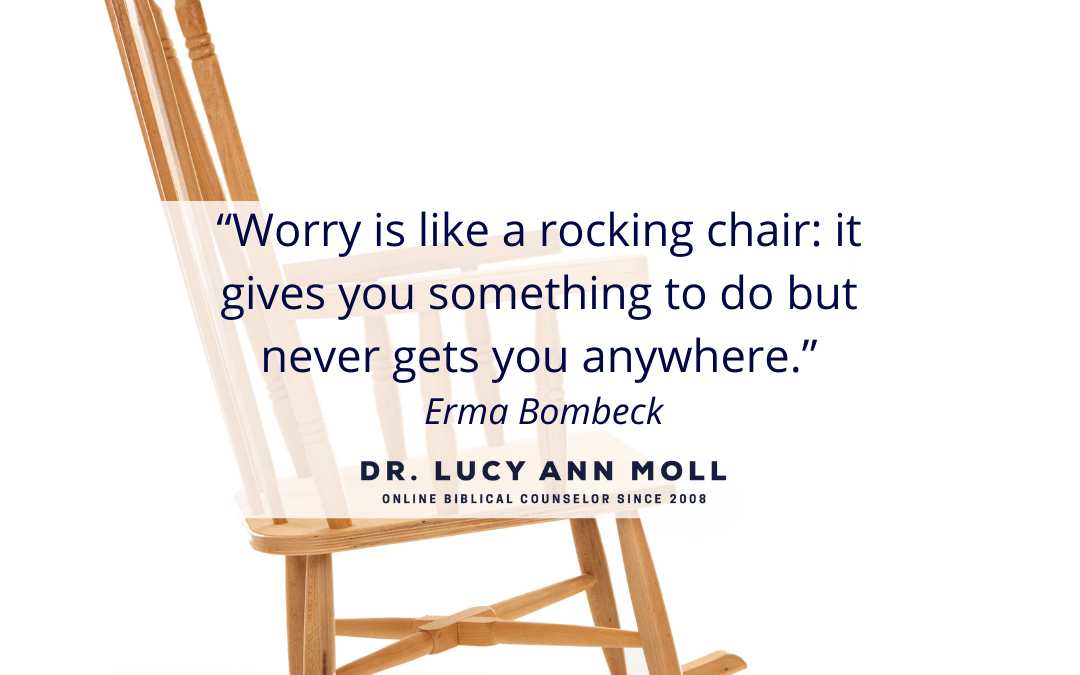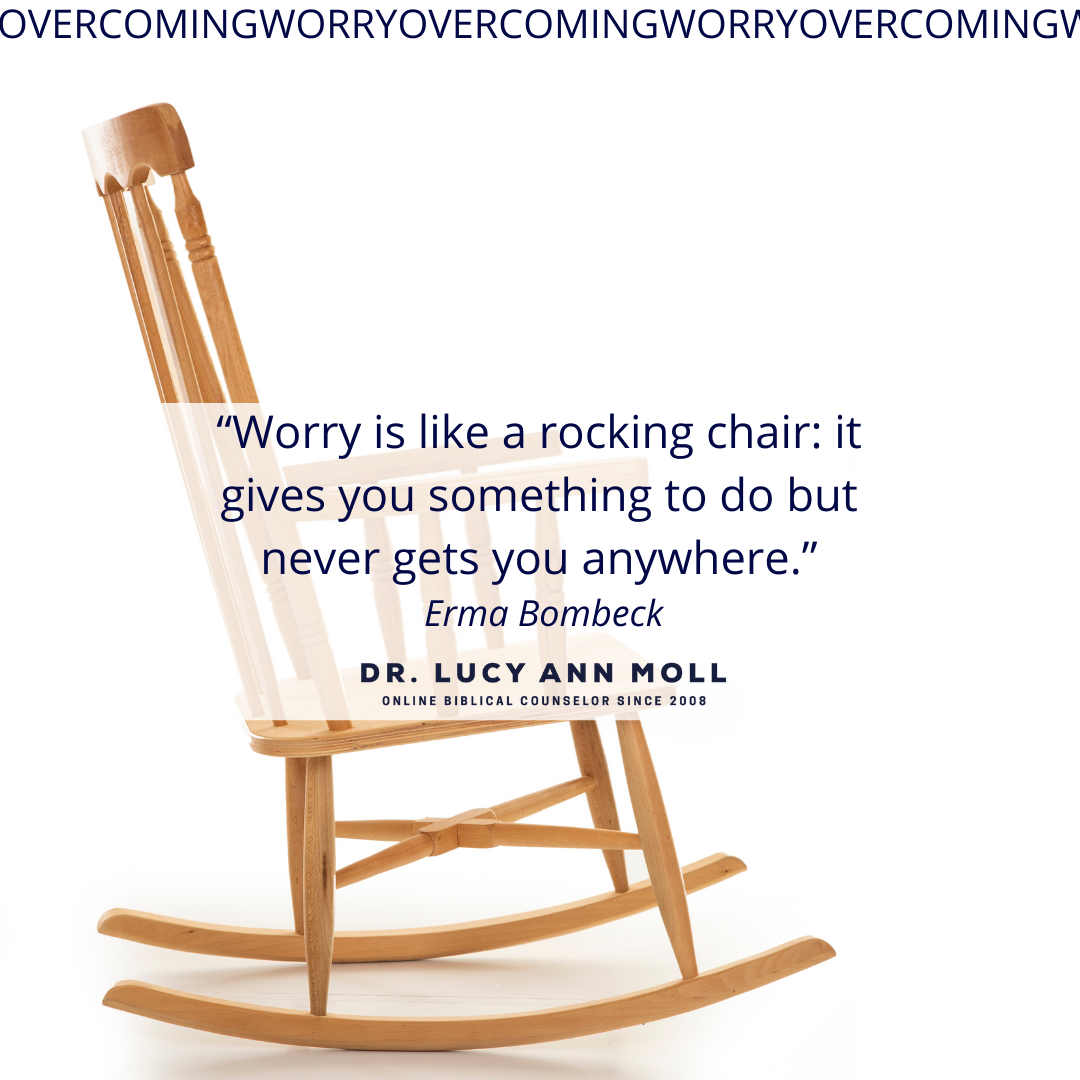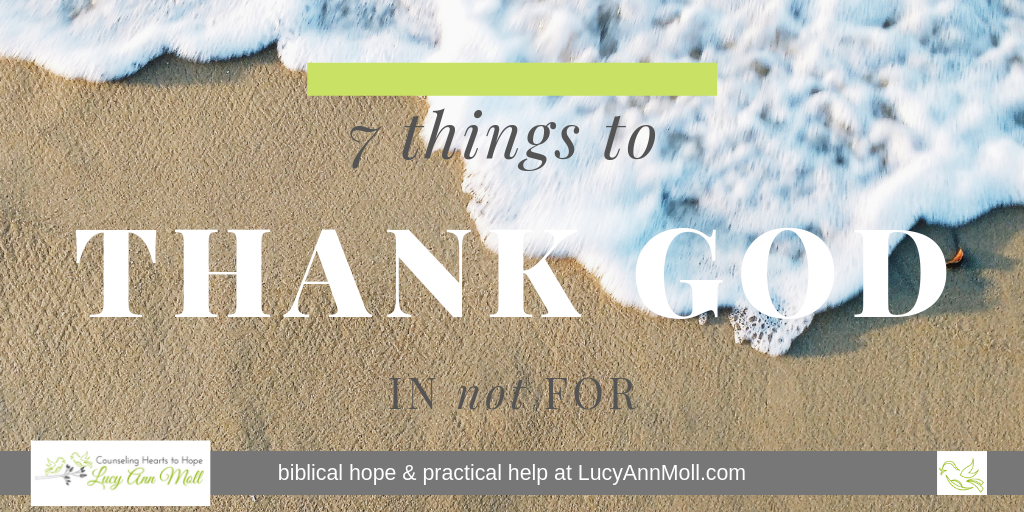
by Lucy | Jun 8, 2021 | biblical counseling, emotions |
Overcoming worry: Who doesn’t want help and hope for recurring, anxious thoughts?
Worriers meditate very well … on the wrong things! Here is an action plan for overcoming worry. This article appeared first here at the Biblical Counseling Coalition website.

My mother-in-law is an expert worrier. She worries about the weather. She worries about dinner turning out alright. And she worries that my husband and I will get home in one piece.
Worry fills one’s thoughts with apprehension. It can keep a person up at night. It also seems second nature, right? Seriously, who does not worry at least some of the time?
Perhaps Erma Bombeck was right all along when she said, “Worry is like a rocking chair: it gives you something to do but never gets you anywhere.”[1]
Worry Defined
Worry is handwringing while overthinking. It is an anxious response to one of life’s many trials (John 16:33). The word worry from Old English is wyrgan, which means “to choke” or “strangle.”
The parable of the sower nails the downside of this type of fear. “The worries of this life, the deceitfulness of wealth, and the desires for other things come in and choke the word, making it unfruitful,” (Mark 4:19). The worries of this life distract us from the gospel, for certain.
 While it demonstrates a lack of faith, ordinary worry that most of us experience does not result in significant impairment: someone who worries can still hold down a job, study for exams, put a finishing touch on a sermon, and so forth.
While it demonstrates a lack of faith, ordinary worry that most of us experience does not result in significant impairment: someone who worries can still hold down a job, study for exams, put a finishing touch on a sermon, and so forth.
In contrast, debilitating worry that results in distress/disability (and often muscular tension and physical complaints) is an essential feature of Generalized Anxiety Disorder (GAD). Statistics estimate that GAD affects 6.8 million people, or 3.8 percent, in the United States in any given year; women are twice as likely to have this diagnosis.[2]“Everything” causes them to worry—health, work, family, school, money. They dread each day.
But God …
God lovingly urges us to worry about nothing. We all know this cornerstone verse on handling anxiety. “The Lord is at hand; do not be anxious about anything, but in everything by prayer and supplication with thanksgiving, let your requests be made known to God” (Phil. 4:5-6).
The temptation to worry can be overcome as we trust God in all circumstances. As we trust Him and desire to please Him (Matt. 6:25-34), we focus less and less on ourselves and our cares. We grow in believing God’s promise to provide for all of our needs. We reach out to help others.
So, how do we practically overcome worry?
Anti-Worry Action Plan
The biblical solution to worry sets squarely on what we think and do, and at its heart is self-counsel. “What we say to ourselves controls much of what we do, whether right or wrong, true or false, which is the fruit of what we believe,” writes Paul Tautges.[3]
This self-counsel helps us reject lies and speak biblical truths to ourselves about God, ourselves, and our circumstances. Here are components of an action plan that we might use to teach ourselves and our counselees how to think and act biblically.[4]
Think Biblically
- Remember God’s promise to care for you whatever your circumstance. Review Psalm 23, Matthew 6:25-34, and Luke 12:22-34. Choose one passage to memorize and meditate upon.
- Ask God for His help to change your pattern of worrisome thoughts. Memorize 1 Thessalonians 5:17. Review Hebrews 4:15.
- Determine to think on things that please the Lord (Phil. 4:8). When worrisome thoughts invade (as often they do), replace them with faith-filled thoughts. Here is help on how to do this.
- Daily review simple yet profound truths that counter worry. Here are three based on Matthew 6:25-35. (Read 11 more of these truths here.)
- God commands me not to worry; worry is sin (vv. 25, 34).
- God provides all of our material needs (v. 33).
- Today has enough trouble; there’s no sense to borrow more from tomorrow (v. 34).
Act Biblically
- Pray always with thanksgiving (Phil. 4:6; 1 Thess. 5:17).
- Bless others with tangible and genuine expressions of biblical love and service.
- Regardless of how you feel, do what you know is right (Rom. 12:1) and view your circumstance as an opportunity to grow spiritually because God works all things together for good in your life (Ps. 37; Rom. 8:28-29; Phil. 1:6).
In Summary
Worry is anxious fretting about something that has not yet happened. It reveals mistrust in God. By worrying, we may feel in control. We may actually rely on it to provide a false sense of security.
Corrie Ten Boom once said, “Worry does not empty tomorrow of its sorrow. It empties today of its strength.”[5]
To that end, let us turn to God for true peace and rest (Matt. 11:28-30). As we repent of worry and follow a Bible-based action plan, we will see practical change in our lives.
Question for Reflection
- What types of worry fill your thoughts or those of your counselees? Finances? Health? Work? Family?
- How might prayer help you or your counselees to express worry-free contentment? Here are two examples: “Jesus, help me to trust you with my future rather than become anxious about my job.” “Jesus, when I am tempted to worry, help me to practically love the people around me.”
[1] Erma Bombeck Quotes, Goodreads, accessed May 27, 2021, https://www.goodreads.com/quotes/140315-worry-is-like-a-rocking-chair-it-gives-you-something.
[2] “Generalized Anxiety Disorder,” Anxiety and Depression Association of America, accessed May 27, 2021, https://adaa.org/understanding-anxiety/generalized-anxiety-disorder-gad.
[3] Paul Tautges, “14 Daggers that Help Kill Worry,” Biblical Counseling Coalition, December 2, 2014, accessed May 27, 2021, https://www.biblicalcounselingcoalition.org/2014/12/02/14-daggers-that-help-to-kill-worry/.
[4] This action plan draws majorly from John C. Brogan’s Self-Confrontation: A Manual for In-Depth Discipleship.
[5] Corrie Ten Boom, Clippings from my Notebook, (Thomas Nelson Inc., 1982).

by Lucy | May 27, 2021 | biblical counseling, thoughts |
All of us talk nonstop in our heads, but few of us think well. Our nonstop thoughts are typically negative or downright nasty.
- “You’re so stupid.”
- “I just cannot take one more sleepless night.”
- “Things are never going to change. I’m stuck.”
- “No one loves me.”
Thoughts are powerful, aren’t they? What we think directly affects our emotions and actions. Consider this Scripture on thought-power: “For as he thinks in his heart, so is he” (Proverbs 23:7, NLT).
It is wise, then, that we become aware of what we think, and root out the lies we believe and replace them with the truth that sets us free. When we think well, our emotions and actions will line up with God’s Word, and we will become increasingly free of anxiety, worry, anger, despair, and enslavement to everything from pizza and Chardonnay to social media and erotica.
What we believe on, we will inevitably act on.
What is “thinking well”?
To think well you need to continually believe God’s truth. “Continual,” a present participle in the Greek, basically means, now that you believe Christ for your salvation, keep on continually believing Him all day, every day. “Therefore, as you received Christ Jesus the Lord, so walk in him” (Col. 2:6, ESV).
When you continually believe God, you are thinking well, and your emotions and actions fall in line.
Continual belief is a faith walk. It’s not easy. Consider folks in the Bible who harbored the sin of unbelief; that is, rejecting what God says is true. Among them:
Abraham. He lied. He passed Sarah off as his sister to protect himself against Egypt’s pharaoh. Moses. He murdered. David. He bedded another man’s wife. Yes, adultery. Naomi. She pity-partied. And Eve. She and her husband ate the forbidden fruit and. You know the rest of the story.
CHALLENGE: Imagine how your emotions would soar if you continually believed God and grasped how to think well. Do you want a huge drop in fear or anger or depression or addiction?
But how do you “think well”?
To think well is to choose thoughts that agree with God’s truth and that result with in action steps. Here are the four parts:
- Clue in to your current emotions.
- Watch what actions follow these emotions.
- Begin to identify the lies you believe.
- Replace the lies with God’s truth.
And, lastly, take a specific action step that aligns your life with the God’s truth. As we overcome the toxic, ungodly thinking that distort our emotions, we’ll discover the contentment in Christ. Who doesn’t desire that?!
If you would like a FREE Think Well chart to help you get stop negative thinking, send me a contact message and mention the chart.
Question: What is one thing that you will do to think well?

by Lucy | Apr 16, 2021 | biblical counseling, emotions
Is it possible to live anxiety-free and in peace? To be “anxious for nothing,” as the apostle Paul mandated us believers (Phil. 4:6, NKJV)?
In his book Anxiety: Knowing God’s Peace (P&R Publishing, 2019), Paul Tautges defines anxiety as a distracting care – “to have our minds and our hearts in two worlds.” This distracting care diverts our attention from the eternal Lord to temporal, earthly concerns. Anxiety not only divides our minds, but also weighs us down.
This article appeared first here on the Biblical Counseling Center (BCC) website. I’ve counseled through BCC since 2014 (now exclusively through Telehealth online video), and I specialize in helping women and families overcome fear, worry, and panic.

We can also describe anxiety as the emotion of uncertainty. Sometimes, it reveals itself as a conglomeration of nagging worries. Nothing horrible or deadly, more like a swarm of mosquitoes than an agitated rattlesnake.
At other times, anxiety is a debilitating panic. It can feel like a knife stabbing you in the chest with every breath, or like a lump in the throat, or sweaty palms, or wobbly Jell-O knees, or any number of uncomfortable, unwanted body sensations experienced when we’re highly stressed. It can also show itself as fear of man or any number of other expressions of anxiety.
Whether nagging worries, or debilitating panic, or any other expression of it, anxiety has powerful and negative effects on the body. We’ve all experienced it personally.
Peace through understanding anxiety’s effects
A pressure is first evaluated in the mind. “Do I have enough money in the bank to cover the $200 water bill?” If we check our account and it has several thousands in it, we relax. But if there is only a measly $20, our pulse may quicken and our thoughts may scurry like mice, looking for an answer to our financial conundrum.
 When anxiety persists (and often it does in today’s chaotic times), it can have negative effects on the body: muscular tension, headaches, gastro-intestinal problems, and so forth. When left unresolved, anxiety may lead to depression and other negative emotions as well as phobias, panic attacks, and compulsive behaviors. (Since some of these problems may have an organic, physical cause, it is always wise to consult a health practitioner.)
When anxiety persists (and often it does in today’s chaotic times), it can have negative effects on the body: muscular tension, headaches, gastro-intestinal problems, and so forth. When left unresolved, anxiety may lead to depression and other negative emotions as well as phobias, panic attacks, and compulsive behaviors. (Since some of these problems may have an organic, physical cause, it is always wise to consult a health practitioner.)
When I’m mildly anxious, my upper shoulder muscles often become tight and a tension headache may ensue. If I ruminate on whatever is bothering me into the evening, insomnia is my probable bed companion. Sometimes I stress-eat chocolate.
If my anxiety goes way beyond nagging worries and has catapulted into panic, a horribly frightful and often recurring experience I’ve described in Help: I Get Panic Attacks(Shepherd Press, 2019) and in this blog article, “The Truth of a Panic Attack,” then my bodily sensations may include a racing heart, perspiration, numbness of fingers and toes, feeling faint, and a sense of doom.
With anxiety, we’ve each lived it, hated it, and wished it gone, yet it hangs like chains around our hearts.
In Psalm 31, David describes the interconnectedness of the body and the mind, and he nails the solution; that is, turning to God: “But as for me, I trust in You, Lord, I say, ‘You are my God.’” I encourage you to invest a few minutes in reading it and meditating on its truths.
Peace through the renewing of the mind
A mind renewed by the truth of God as revealed in Scripture is the only lasting antidote for anxiety and other negative emotions. Tautges counsels, “Ultimately, security and peace come from the Lord—from knowing and trusting the character and love of God. So don’t let your anxiety lead you away from God. Run to Him today.”
Indeed, a right view of God will replace anxiety with peace.
Lisa came to counseling for anxiety. As I heard her story, I learned that she had been an excellent student and a rule follower. It was important to her to please her parents and her teachers. Now married, she desired to please her husband too. When she received his approval (or at least not his disapproval), she felt good. When she feared that he wasn’t pleased, her anxiety ruined her day. She became extremely introspective and also irritable, trying to figure out how to get her husband’s favor.
As you probably gathered, the root problem of her anxiety was the fear of man, specifically her husband. She wasn’t afraid of him in the sense that she thought he might hit her. Rather, she feared his disapproval.
Proverbs 29:25 says, “The fear of man lays a snare, but whoever trusts in the LORD is safe.”
In counseling, she learned to be resolute in doing what was right in the eyes of God, not in the opinion of her husband. This also required some uncomfortable conversations with her husband. Ephesians 4:15 calls us to speak the truth in love. As Scripture renewed her mind, she determined to take a leap of obedience and to trust and obey God. She took to heart 2 Timothy 1:7— “For God has not given us a spirit of fear, but of power and love and discipline.”
Peace through an actionable plan to overcome anxiety
The Bible urges us to renew our minds (Rom. 12:2, Eph. 4:23). But how does this happen, this renewing of the mind? This is a common question among anxiety-plagued Christians who are seeking a biblical solution. Let us consider these four parts.
First, right belief.
Overcoming anxiety begins with the right belief about the goodness and greatness of God, and our relation to Him. He is the Creator, we are the created. He is the Potter, we are the clay. Consider studying the attributes of God. A good study Bible would be helpful in this endeavor, so are books on this topic by A.W. Tozer, Arthur W. Pink, and (more recently) Jen Wilkins.
Second, right thoughts and desires.
What we believe is the foundation for our thinking. “As a man thinks, so he is” (Prov. 23:7). Our thoughts are a reflection of who we really are.
Third, do right.
Our actions flow from our beliefs and our thoughts. Even though it is difficult, we must not let our emotions rule us. God calls us to live by faith, not our feelings.
Fourth, feel right.
When we “do right,” that is to trust and obey God as His beloved children whom His Spirit guides and empowers, we will feel right. We have the peace that comes from a renewed mind.
Example: When the shepherd boy David brought lunch to his older brothers who were part of the Israelite army cowering in fear (1 Sam. 17), he took stock of the scene. He viewed the giant Goliath as a tiny, annoying gnat in comparison to the almighty God whom he served. In the presence of all gathered, he declared to Goliath, “You come to me with a sword, a spear, and a saber, but I come to you in the name of the Lord of armies, the God of the armies of Israel, whom you have defied. This day the Lord will hand you over to me. (17:45-46a, NASB).
We all know the rest of this story. David killed that giant with a sling and a stone, and the victory belonged to God.
David displayed right belief > right thinking/desire > right action > right feeling. How can you and I do the same? Recall Paul’s admonition in Phil. 4:9: “As for the things you have learned and received and heard and seen in me, practice these things, and the God of peace will be with you.”
Closing reflection
I hope this description of anxiety and God’s solution to it have given you more insight into how to respond biblically when nagging worries, debilitating panic, the fear of man, or another expression of fear assails you or a loved one.
We can gain more empathy for those who have anxiety. We can remember that God gives us His solution for overcoming it and finding peace. What is a practical and Godward action step that you can take today?

by Lucy | Jul 3, 2019 | emotions, identity in Christ, People Who Hurt, thoughts
My funk came out of nowhere and I forgot to thank God. Not for the funk. That would be insane, right? But in the craziness of normal life.
Example 1: I sent my water bill payment to the electricity company, and the water company threatened to turn off my H2O.
Example 2: My cat tossed his cookies. And she boot-scooted, drawing criss-cross lines on the carpet. I’ll spare you a visual.
Example 3: Okay, this next one isn’t crazy but super stressful.
My college-age son, who lives 1,200 miles away, had to find a new place to stay fast. So I worried, and when I worry, I wake up a million times during the night, covers off, covers on, covers off. Not only that, my back tightens and my feet go all numb-y. Then I dwell on The Injury. And I fear a repeat.
Don’t Do What I Did
In the middle of my funk I focused on me. I failed to think about the all-powerful God who has my back. And I forgot to thank God.
But thanking God is his will!
Many times when I counsel hurting women they ask about God’s will for their lives, and we have rich conversations. I listen to their life story in the light of God’s redemptive plan for them. And it becomes clearer — God’s will.
Annie’s husband just lost his job. And she’s concerned but hopeful. Her husband’s a good guy, a harder worker, an amazing dad to their three kiddos. But now they don’t have health insurance. And the youngest needs physical therapy. And so she worried.
We opened to this snippet of Scripture:
give thanks in all circumstances; for this is the will of God in Christ Jesus for you. 2 Thessalonians 5:18
There it is. Thank God.
Click & Tweet!
Instead, Thank God
Often I give a “thank God” assignment to counselees. For 20 minutes, they list everything going on in life: the vacation to Hawaii, a costly car repair, a kid’s high school graduation, a husband’s lost job, and so on. You’ll note “good” and “bad” stuff on the list.
Then we give thanks.
Lucy, are you nuts? How could anyone possibly thank God for the bad stuff, right?
Click & Tweet!
But God says give thanks in all circumstances. In is not for. Really, who thanks God for cat barf and boot scoots? As we thank God in all circumstances, we recognize he’s is in control and knows exactly what we face. He is with us, in us. Thanking God becomes worship.
Click & Tweet!
When Annie made her list and thanked God in her circumstances, her focus shifted from self to God and her worry disappeared.
My 7 Things (plus one)
Now let’s give it a go. List everything happening in life. I’ll share the first 7 that come to mind.
- The pistachios I ate for lunch.
- My messy desk.
- Birds tweeting.
- My daughter’s MS (yes, that).
- Books!!!
- Wednesday nights studying Revelation with 20 others.
- Friends all over America but none near me in my new town.
- BONUS: My husband — I really don’t deserve him.
As expected, when I wrote my list, my spirit lifted. Remembering God for the little things, even the hard things, helped put my circumstances in perspective, and thank him. I entered into worship.
May I encourage you to set your timer to 20 minutes and list everything going on in your life? You’ll probably get stuck 5 minutes in. This is normal. Don’t give up. Keep going. Then thank God in all circumstances.
Let me know how it goes.


by Lucy | Dec 4, 2018 | biblical counseling, emotions
The storms of life are unpredictable and scary. But God’s up to good. And you can trust him in them.
Click & Tweet!
Featured in Heart2Heart Counseling Directory, Shannon Kay McCoy shares 3 lasting lessons on the storms of life. Be sure to check out her personal counselor page here.
Her article appeared first here at The Biblical Counseling Coalition and is used with permission.

While growing up in South Carolina, I loved thunderstorms. I watched the howling wind blow leaves from the tree branches and the raindrops beat down on the grass under the dark, gray sky.
If we were at my Granny’s house, she would make us unplug everything electrical. That meant no TV or radio (there was no internet in those days). My siblings and I had no other choice but to play with each other. We found a way to endure the storm until it blew over.
Sometimes storms can cause much damage and wreak havoc in the lives of many. While the news focuses on environmental storms, there are other storms just as devastating that people experience every day, such as sickness, financial hardship, and broken relationships. These storms of life threaten our peace, comfort, and joy, and often bring about fear, doubt, and hopelessness.
Jesus Calms a Storm
In Mark 4:34-41, the disciples found themselves caught in a ferocious storm while on a boat in the middle of the Sea of Galilee and simultaneously in a spiritual storm of fear and doubt. They feared for their lives. Jesus was fast asleep in the stern of the boat while the storm was raging. They woke Him and said,
“Teacher, do you not care that we are perishing?” (4:38).
 Jesus woke up, calmed the storm, and questioned their faith in Him (4:40). They were no longer afraid of the storm, but very afraid of the supernatural power of Jesus that led them to wonder who He was, that even the wind and sea obey Him (4:41).
Jesus woke up, calmed the storm, and questioned their faith in Him (4:40). They were no longer afraid of the storm, but very afraid of the supernatural power of Jesus that led them to wonder who He was, that even the wind and sea obey Him (4:41).
The disciples learned significant lessons that day that transformed their lives. We can learn much from their experience as we face the storms of our own lives.
God Ordains the Storms of Life
The idea that God permits bad things to happen to His children is a very hard pill for some of us to swallow. “It doesn’t make sense for a loving God to allow His followers to suffer,” some would say. This is a simple conundrum to solve.
Jesus tells us in John 16:33,
“In the world you will have tribulation. But take heart; I have overcome the world.”
Jesus promises us that we will have trials and tribulations in this world, but because He has overcome the world, we can trust Him in the storms.
Click & Tweet!
When storms hit, we often wonder, “Why is this happening?” In James 1, we see that God has a purpose for every trial that we experience. God uses trials to test the genuineness of our faith.
The disciples’ faith in Jesus was being tested in the storm. They questioned the very character of Jesus, implying that He did not care for them. We may feel the same way when we face a health crisis or a financial hardship that may cause us to lose our home. But 1 Peter 5:7 reminds us to cast all of our cares and concerns on Jesus, because He cares for us.
God Is in Control of the Storms of Life
The disciples were filled with great fear when Jesus rebuked the wind and told the sea, “Peace! Be still!” (Mark 4:39). Jesus displayed amazing supernatural power over nature. We learn, along with the disciples, that Jesus can be trusted in the storm. This is because He is sovereign.
God’s sovereignty is described in Psalm 24:1-2:
“The earth is the LORD’s, and everything in it, the world, and all who live in it; for he founded it on the seas and established it on the waters.”
God is in perfect control of the universe. He is involved in everything in this world and is directing all things, people, nature, etc. to fulfill His divine purposes. When facing the storms of life, understanding the sovereignty of our amazing God is essential.
The disciples showed us both what to do and what not to do. They were right to go to Jesus in the storm. However, they fell short because they went to Him in fear and doubt. Jesus wanted them to have faith in Him in the midst of the terrible storm. In Philippians 4:5-6, we learn how to replace our fear and anxiety with prayer, supplication, and thanksgiving.
We are released from the grip of fear and anxiety when we thank Him for His sovereign power and purpose for the storms. We can trust His promise that His peace will guard our hearts and minds so that we will not be fearful or anxious during the storm (Phil. 4:7).
God Is for You in the Storms of Life
In their fear, the disciples questioned if Jesus cared for them. He asked them, “Why are you so afraid? Do you still have no faith?” (Mark 4:40). Not only did Jesus rebuke the wind and the waves, but He rebuked the disciples for their unbelief.
Their unbelief caused their fear, and their fear caused them to question whether Jesus really cared. Jesus expected them to know that He was for them and that He did not want to destroy them.
Isaiah 41:10 states,
“Fear not, for I am with you; be not dismayed, for I am your God.”
Believing that God is for you can transform your life. When trials come, you will not be tempted to doubt God’s love, care, and concern for you. When it seems like there is no sound coming from Heaven, you can still believe that God is for you.
The storms of life are part of God’s sanctification plan, revealing your heart, and growing you into His image. Do not let the difficult storms become bigger than the promises of Jesus.
Click & Tweet!
He promises to be with you through any storm that He allows in your life (Isa. 43:2). Allow the storms of life propel you to trust God as your refuge and deliverer.
Questions for Reflection
- When the storms of life hit, what is your first reaction?
- Can you look back on previous storms in your life and accept that God ordained the storm and was in control of it?
- How will the realization that God is for you impact your fear?
Resource for YOU
 I have the awesome privilege of counseling women and families by Skype and FaceTime all over the world! If you’d like to know more about this wonderful resource of online counseling, please look over this and be sure to request a complimentary counseling phone consult. Cheers!
I have the awesome privilege of counseling women and families by Skype and FaceTime all over the world! If you’d like to know more about this wonderful resource of online counseling, please look over this and be sure to request a complimentary counseling phone consult. Cheers!
Counseling Hearts to Hope,


 While it demonstrates a lack of faith, ordinary worry that most of us experience does not result in significant impairment: someone who worries can still hold down a job, study for exams, put a finishing touch on a sermon, and so forth.
While it demonstrates a lack of faith, ordinary worry that most of us experience does not result in significant impairment: someone who worries can still hold down a job, study for exams, put a finishing touch on a sermon, and so forth.




 When anxiety persists (and often it does in today’s chaotic times), it can have negative effects on the body: muscular tension, headaches, gastro-intestinal problems, and so forth. When left unresolved, anxiety may lead to depression and other negative emotions as well as phobias, panic attacks, and compulsive behaviors. (Since some of these problems may have an organic, physical cause, it is always wise to consult a health practitioner.)
When anxiety persists (and often it does in today’s chaotic times), it can have negative effects on the body: muscular tension, headaches, gastro-intestinal problems, and so forth. When left unresolved, anxiety may lead to depression and other negative emotions as well as phobias, panic attacks, and compulsive behaviors. (Since some of these problems may have an organic, physical cause, it is always wise to consult a health practitioner.)


 I have the awesome privilege of counseling women and families by Skype and FaceTime all over the world! If you’d like to know more about this wonderful resource of online counseling, please look over
I have the awesome privilege of counseling women and families by Skype and FaceTime all over the world! If you’d like to know more about this wonderful resource of online counseling, please look over 

